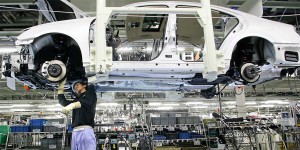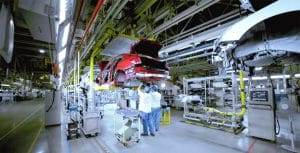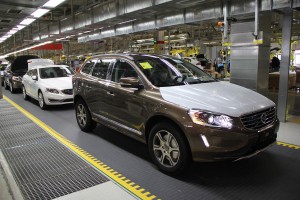
Hyundai workers in South Korea are getting some unwelcome time off as the automaker is forced to close its plants due to Chinese-made parts shortages.
At a frightening pace, the coronavirus continues to spread, with the number of those affected by the disease, by some counts, already topping 100,000. But the impact is now being measured by more than just the physical toll as the epidemic begins to hammer the Chinese economy, with the first signs it is spreading abroad.
Nowhere is that more apparent than in the auto industry. Chinese car plants are expected to remain closed until at least the beginning of next week as authorities enact countermeasures to cope with its contagiousness. Plants could be shuttered even longer in some parts of the country, such as hard-hit Wuhan, the city where the disease appeared to have emerged.
That alone threatens to devastate global industry earnings, BMW already saying it expects a 5% hit to its bottom line this year. But with China one of the world’s major producers of automotive parts and accessories, the crisis is starting to be felt more directly abroad. Hyundai has now suspended production at its Korean assembly plants due to a shortage of Chinese-made components.
(China’s coronavirus crisis could cripple car production in the U.S.)
“Automakers with factories outside of Wuhan said this week that they are scheduled to start (back up) next Monday,” said Michael Dunne, head of Asian automotive consulting firm ZoZo Go LLC. “The reality is that no one knows how this will play out.”

GM, China’s third-largest automaker, could suffer substantially if the coronavirus keeps plants closed for longer than the next week or so.
China ships relatively few vehicles abroad, but it exports about $70 billion worth of car parts and accessories globally. South Korea is particularly dependent upon Chinese suppliers, the automakers saying the planned shutdown of its home market plants is “due to disruptions in the supply of parts resulting from the coronavirus outbreak in China.”
The question is whether auto plants in other markets will be impacted, notably those in the United States. About 20% of Chinese auto parts exports wind up in the U.S., though much of that winds up in the automotive aftermarket. Nonetheless, the reach is extensive, the list of Chinese-made automotive goods covering everything from steering wheels to shock absorbers, down to literal nuts and bolts, washers, springs and copper rivets.
“This will be horrendous in the supply chain, it’s going to be awful for companies and it will show in their quarterly reports and global strategy going forward,” Rosemary Coates, a supply chain consultant and executive director of the Reshoring Institute, a non-profit focused on expanding manufacturing in the U.S., told the New York Times “It’s going to show and it’s going to hurt.”
For the moment, those U.S.-based manufacturers whom TheDetroitBureau.com spoke to indicated there has been no impact on their American operations – yet, though, as a Ford spokesperson cautioned, “We are monitoring the situation closely.”

Volvo builds XC60 SUVs at its plant in Chengdu, China, and that plant could face parts shortages if the coronavirus isn’t contained quickly.
In an industry that has largely migrated to a just-in-time production model, parts shortages can happen quickly – as Ford discovered following a fire at a Michigan plant providing magnesium components for its F-150 pickup. With little back-up inventory, the truck was out of production for weeks.
(Coronavirus expected to have big impact on Chinese auto industry)
Automakers typically allow for somewhat more back-up supplies with overseas parts and components, industry analysts said, giving potential short-term cover, but the longer the Chinese extend factory closures the more the auto industry is at risk.
A number of global automakers have been evacuating their foreign nationals from China while also barring employees from flying to that country until the coronavirus outbreak is brought under control. In some cases, such efforts have come too late. Auto supplier Webasto shut down its headquarters outside Munich after finding four of its employees were infected following a visit by a staff member from China.
Even if the shutdowns don’t last more than another week or two, the impact on the Chinese auto industry will be substantial. And, considering that China has become the world’s single-largest market for a number of manufacturers, including General Motors and Volkswagen AG, the effects will still be seen worldwide on industry financial reports.

Officials in much of the country are pressing to keep people out of schools, offices and factories for at least another week due to the coronavirus.
All told, Chinese plants roll out an average 500,000 vehicles each week and analyst Dunne sees a minimum loss of about 1 million cars, trucks and crossovers. Consultancy IHS Markit warned that could stretch to 1.7 million or more if the crisis continues to force production cutbacks into March.
BMW isn’t alone with its warning of lower 2020 earnings as a result of the crisis – other automakers are signaling they’re looking at the possible impact, as well.
One of the big concerns is that the Chinese automotive market was already in a rare slump in 2019 and was only expected to stage a slight recovery this year. “Although sales volumes in the first three weeks of January were okay, there was no ‘sales sprint’ at the end of the month. So, it is inevitable that we will see a significant sales drop,” Cui Dongshu, the secretary general of the China Passenger Car Association, noted in a block post last week.
(New vehicle sales in China fall 8.2 percent in 2019)
And with the coronavirus epidemic expected to hammer the Chinese economy overall, the potential impact on the already weak car market could last for some time.
